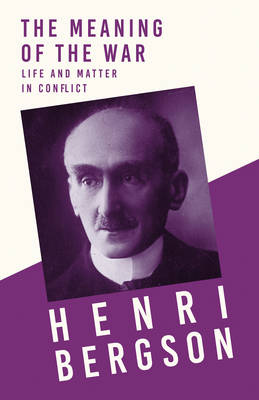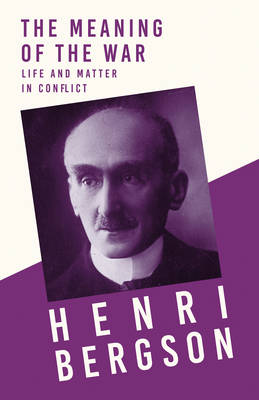
Bedankt voor het vertrouwen het afgelopen jaar! Om jou te bedanken bieden we GRATIS verzending (in België) aan op alles gedurende de hele maand januari.
- Afhalen na 1 uur in een winkel met voorraad
- In januari gratis thuislevering in België
- Ruim aanbod met 7 miljoen producten
Bedankt voor het vertrouwen het afgelopen jaar! Om jou te bedanken bieden we GRATIS verzending (in België) aan op alles gedurende de hele maand januari.
- Afhalen na 1 uur in een winkel met voorraad
- In januari gratis thuislevering in België
- Ruim aanbod met 7 miljoen producten
Zoeken
The Meaning of the War - Life and Matter in Conflict
With a Chapter from Bergson and His Philosophy by J. Alexander Gunn
Henri Bergson, J Alexander Gunn
Paperback | Engels
€ 17,95
+ 35 punten
Omschrijving
"The Meaning of the War - Life and Matter in Conflict" is a 1915 work within which Henri Bergson explores Germany's policy of 'might is right' as practised by Bismarck, the Prussian empire, and Germany in its long and bloody history of aggression against its neighbours. Contents include: "Life Of Bergson", "Introduction", "Life And Matter At War", and "The Force Which Wastes And That Which Does Not Waste". Henri-Louis Bergson (1859-1941) was a French-Jewish philosopher. He had a significant influence on the tradition of continental philosophy during the first half of the twentieth century until World War II, and is famous for his idea that immediate experience and intuition are more important than abstract rationalism and science for understanding the nature of reality. In 1927, Bergson received The Nobel Prize in Literature. Other notable works by this author include: "The Philosophy of Poetry: The Genius of Lucretius" (1884), "Time and Free Will: An Essay on the Immediate Data of Consciousness" (1889), and "Matter and Memory" (1896). This classic work is being republished now in a new edition complete with a Chapter From "Bergson And His Philosophy" by J. Alexander Gunn.
Specificaties
Betrokkenen
- Auteur(s):
- Uitgeverij:
Inhoud
- Aantal bladzijden:
- 33
- Taal:
- Engels
Eigenschappen
- Productcode (EAN):
- 9781528715737
- Verschijningsdatum:
- 26/05/2020
- Uitvoering:
- Paperback
- Formaat:
- Trade paperback (VS)
- Afmetingen:
- 140 mm x 216 mm
- Gewicht:
- 54 g

Alleen bij Standaard Boekhandel
+ 35 punten op je klantenkaart van Standaard Boekhandel
Beoordelingen
We publiceren alleen reviews die voldoen aan de voorwaarden voor reviews. Bekijk onze voorwaarden voor reviews.









